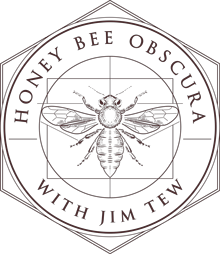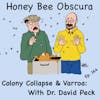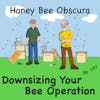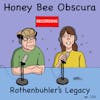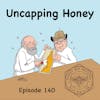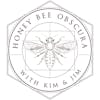Plain Talk: Leftover Honey (175)

In this episode, Jim explores the practical aspects of dealing with "less-than-pristine" honey, an inevitable challenge for many beekeepers. Throughout the discussion, Jim shares personal anecdotes and insights from his extensive experience, providing...
In this episode, Jim explores the practical aspects of dealing with "less-than-pristine" honey, an inevitable challenge for many beekeepers. Throughout the discussion, Jim shares personal anecdotes and insights from his extensive experience, providing a nuanced look at what beekeepers can do with honey that doesn't meet the highest quality standards. Whether it's honey from wax melters, overwintered hives, or colonies affected by varroa, Jim explores the various destinies of these batches. He discusses innovative yet practical solutions like using secondary equipment for processing or repurposing the honey for non-consumable uses.
This episode is packed with expert advice, grounded in the reality of beekeeping, offering valuable tips on managing one of the more complex aspects of honey production.
Join us as we navigate the less glamorous, yet incredibly important topic of managing leftover honey, ensuring nothing goes to waste in the beekeeping world.
Listen today!
______________________
This episode is brought to you by the support of Bee Culture Magazine: The magazine of American Beekeeping since 1873! Each month, Bee Culture delivers the best information in an easy to read magazine, full of content from beekeepers, researchers and regular contributors, including Jim Tew and Beekeeping Today Podcast's, Becky Masterman!
Subscribe today at: https://beeculture.com
______________________
Thanks to Betterbee for sponsoring today's episode. Betterbee’s mission is to support every beekeeper with excellent customer service, continued education and quality equipment. From their colorful and informative catalog to their support of beekeeper educational activities, including this podcast series, Betterbee truly is Beekeepers Serving Beekeepers. See for yourself at www.betterbee.com
______________________
Honey Bee Obscura is brought to you by Growing Planet Media, LLC, the home of Beekeeping Today Podcast.
Music: Heart & Soul by Gyom, All We Know by Midway Music; Christmas Avenue by Immersive Music; original guitar music by Jeffrey Ott
Cartoons by: John Martin (Beezwax Comics)
Copyright © 2024 by Growing Planet Media, LLC

Episode 175 – Plain Talk: Leftover Honey
[music]
Jim Tew: Hello, Honey Bee Obscura Podcast listeners. Jim here, thinking about how I'm going to ease into this topic that at times I wonder why I chose. What I want to deal with is what do you do with honey that's less than pristine? Isn't that a polite way of wording it? What do you do with honey that's not the textbook, beautiful honey that everybody envisions? We all end up with it. There's nothing about it unusual. What do you do with honey that's not as great as it could be? I'd like to talk about that for a few minutes.
Introduction: Welcome to Honey Bee Obscura, brought to you by Growing Planet Media, the producers of The Beekeeping Today Podcast. Join Jim Tew, your guide through the complexities, the beauty, the fun, and the challenges of managing honeybees. Jim hosts fun and interesting guests who take a deep dive into the intricate world of honeybees. Whether you're a seasoned beekeeper or just getting started, get ready for some plain talk that will delve into all things honeybees.
Jim: In all aspects of beekeeping, most categories have the dreamy perceptions of how everything is going to work. The colony is going to winter beautifully. The swarm is going to be close to the ground. The honey crop is going to be produced easily with a gigantic nectar flow on beautiful days. The skies are always clear. These things, they don't work, do they, beekeepers? Those are things we hope for, but we know that bees have to routinely deal with less-than-perfect situations.
In fact, right now it's raining, and to tell you the truth, listeners, I've wondered, why do I tell you when I'm doing a podcast so often that it's raining? Then I've realized that when the weather is marginal, that's a good time to do a podcast. You can't do anything else. You can't go work bees, you can't cut grass, you can't repair the fence, and you can't fix the barn door because of the bad weather. So it's a good time to do a podcast, so yes, here I am talking to you on a rainy, dreary day about a non-exhilarating topic. What in the world do you do with honey that is not your premier grade of honey?
Can I tell you a short story? Everything in my life seems to have happened a long time ago, but many years ago, I had a local newspaper reporter ask to come out and tour the Bee Lab, make some pictures, and get a story about the uniqueness of the Bee Lab in Wooster, Ohio at Ohio State University. Of course, I agreed to it because promotion and fanfare is good.
It was a young woman. She came out. She did a nice job. She asked all the right questions, and she noticed a can of honey that was from the wax melter sitting by the door. It was open. It was not appealing. I had not even thought about it. Those kinds of cans are routine in a honey-extracting operation. You just get this less-than-high-quality honey that accumulates, in this case, from the wax melter.
She said, "What's that?" I said, "Oh, that's just junk honey. That came out of the wax melter. We'll probably feed that back to the bees or do something like that with it." She said, "Well, how much of that do you get?" I said, "Well when you extract," and I tried to explain the extracting process, the uncapping process. She wasn't trying to do a deep dive, an investigative reporter. She just seemed to be trying to understand what this concept that I had introduced her to of junk honey was.
Well, I was mortified two days later when the article came out and it seemed like about a third of it was a deep-dive discussion on how to handle junk honey. I got to tell you, I have that memory right now that I'm talking to you about this. [chuckles] It was not a pretty scene. It was not horrible. She did a good job explaining it and it was understanding and helpful to the readers that these kinds of things do accumulate and there are uses for them.
I've already used one of the magic words, and that was the wax melter. You cannot help it. For the typical wax melter to work, you've got to have that layer of honey underneath. The layer of honey underneath will form as the honey melts out of the wax. It's more dense than the wax. Wax has a higher specific gravity than water so it floats. Most forms of wax melters generate honey that's not really great. It's got a lot of wax residue in it. It's got kind of a toasty flavor because it was heated up to 140 degrees to melt the wax. You just accumulate this. There is that.
Over time, you accumulate this kind of honey from a wax melter. It's common, beekeepers. What do you do then with other types of honey? That's not the only place that it comes from. What do you do if you've got honey on a winter kill colony? I've struggled with this myself. Years ago, before varroa, if a colony died in the winter, just about every time it was because it starved. Not really wanting to get off the subject on the starving bees in the early spring, early summer, but they have a very characteristic look in a starved colony. There's no honey anywhere, and the bees are all head first in the cell so much as possible, trying desperately to generate heat to the very last bee before they all died communally.
That kind of went away and I've made the bold statement in articles and other podcasts and whatever that since the arrival and establishment of varroa in a firm way, I've taken a fair amount of honey off dead bees because in fact, it was not starvation. In all honesty, listeners, part of that was my change in my beekeeping philosophy as I moved away more and more from wanting honey for sales and marketing and whatever and just wanting bees for photography and work and research work and whatever, teaching. I would leave a lot of honey on. We usually left a lot more honey on than the bees actually needed.
Even if the colony didn't die, what do you do with last year's honey and this year's season? That honey is probably, I'm thinking, mostly okay. What I'm really wondering though is what do you do if the colony died? Heaven forbid, what if there was some dysentery? I don't even have photographs of this and if I did I'm not sure I would show them to anyone because it's just not the kind of thing where you want to see sausage being made. You have to figure out what you're going to do with that kind of honey. Do you want to toss it? Are you going to feed it back to the bees or what, you're going to extract it?
I read an article, I read a piece, I read probably some text message clip in a stream somewhere where one beekeeper actually had a secondary odor extractor that he used to process less than pristine honey, and then he kept his better machine for the nice white cappings in this year's crop. That's one way, I guess, of doing it. Kind of extravagant. The alternative then is after you process this less-than-pristine honey, probably pressure washing your extractor tank and getting everything cleaned up so the extractor is back to high standards enough to handle what you're calling now high-standard honey.
So far we've developed some of this honey from wax melters, and so far we've developed some of this honey from deadouts that still had honey left on them. At what point do you just give up on it? Because every time-- I don't want to feed the bees junk, but they say that it's reported in the literature that literally a hypothetical bee flies around the world to produce one pound of honey. I've got 25, 30, 40, 50 pounds of honey in this box. What? That's 50 trips around the world that these bees made? That's a lot of energy expenditure for me just to dig a hole and bury. Part of me just almost cannot discard that honey.
Another part of me says, "Well, what are you going to do with it? Even if you extract it and get it into a five-gallon can, what's going to happen to it then?" Well, it'll go sit in an unused corner somewhere and it'll wait for more five-gallon cans to accumulate there. I don't know what to tell you at this point. I fight with myself about what to do with all of this labor, all of this energy effort, all the work I spent to buy and establish the equipment, we've got a good season, we've got the honey on, and now this honey is less than perfect.
Listeners, this is a good time to take a quick break. Today I'm happy to welcome Bee Culture Magazine as a new sponsor of Honey Bee Obscura. I'll be right back.
Bee Culture: Ready to take your beekeeping skills to the next-level? Dive into Bee Culture, the magazine of American beekeeping where each month you'll get expert insights, equipment tips, varroa control strategies, and sprinkles of humor from Stephen Bishop and Ed Kolby. Exclusively for Honey Bee Obscura listeners, subscribe now at beeculture.com for just $35 a year. Use the code podcast for a special bundle offer. Receive your hard copy delivered monthly along with full online digital access. Bee Culture, your ultimate beekeeping partner. Join our buzzing community today.
Betterbee: Give your buzzing buddies the ultimate upgrade with BetterComb. Accelerate your bee colonies' growth and honey production with our innovative solution. Made from a synthetic wax that mirrors the qualities of natural beeswax, BetterComb offers a clean slate for your bees to thrive without any pesticide or disease residue. Don't compromise on quality.
Opt for BetterComb and watch your colonies flourish. Learn more at betterbee.com/bettercomb.
[music]
Jim: Listeners, what if the honey sits there and granulates? Then what's going to happen? You've got how much granulation? You should be asking me right now, complete or partial or what? Well, let's just say that it's partial to make this just as confusing as we can. You've got maybe a third to a half of a deep just to put some parameters on it and it's a third crystallized, but there's a lot of liquid honey still there. But you know if you extract that, that it's going to crystallize very quickly in a five-gallon bucket or alternatively, do you even care because it's probably going to crystallize sooner or later anyway and you're going to have to reheat it to reliquify it. That's a totally different subject. I'm becoming cautious about using plastic buckets as heating sources for reliquifying honey, but not in this segment. I cannot get off this subject on that.
If you then decide to extract it, then you got to be extra careful that you get those crystals out of that extractor because those crystals would serve as condensation nuclei and would make otherwise perfectly good honey, slightly more intent on crystallizing then after coming out of that extractor. It's not the end of the world, but it's just something that you probably want to think of.
What are you going to do then? Are you going destroy that honey? Are you that away? Are you going to tear those combs down? I don't know how to answer that. It's a decision that you'll make when you see how many frames, how much comb, how much labor, how much work, how much cost. All of those things will decide what you're going to do then.
There is another category. What if the equipment was on diseased bees?
Now, of course, the grandfather, grandmother of bee-diseased honey is American foulbrood. If you had a varroa bomb and you had a lot of dysentery droppings, or if you just had a dysentery outbreak, if you had a running wild case of Chalkbrood, you still feel okay about that honey, are you going to extract it and are you going to put it on your breakfast biscuits? Are you going to feed it back to the bees wondering if any of those fungal spores, not supposed to be transmitted that way, but are they?
You're supposed to be an aseptic beekeeper doing the best you can in clean here and now you're propagating this with suspect honey. Then we're back to what, that hole in the ground where you're pouring it out again? These things really bring up issues that are not clearly resolved. Kind of a spoiler alert, they're not going to be clearly as resolved in this segment, but I need to tell you that this does happen.
It happens to every beekeeper who keeps bees more than a few years and processes honey and just has the routines ups and downs of what's going on. Then you get into, well, let's feed it back to the bees. I tried to prepare some on this because try as I might, I can't get a good scientific description on how honeybees literally physically eat honey.
When those bees are going to honey, that's at what? 55 degrees Fahrenheit, just thick as cement. Are they able to suck that up with their chewing, lapping mouth parts just like they're using a soda straw? That just seems improbable to me.
For the second, third, or fourth time, not wanting to get off the subject here, when you decide to feed honey back to bees, I think it's a different situation for them. Honeybees are certainly able to somehow load thick honey up, which is dramatically different, it seems to me, from the capillary action used to load nectar in their mouth parts. I'm going to offer some conjecture that parts of their hairy-tipped mouth parts are able to capture and pull in small amounts of that honey. They add saliva to it, they reliquify it, they take it back to their honey crop, and over time with that abdomen pulsating and the mouth parts moving back and forth, they over time can reload honey. It does appear to be a hard job. It does appear to take time getting it done. So you can feed it back to the bees but don't go crazy with it.
Then we get into the controversy of do you water it down or not. Some beekeepers suggest never water honey down when you're feeding it back to the bees, let the bees take it straight. Well, I just put you through the episode about how this may be something the bees can do, but they're going to do it slowly and tortuously. If you add water to it, then there's an excellent chance that if the bees don't take it, then it's going to ferment and if you add water to it then there's nothing else you're going to do with it. It sooner or later is going to go bad or turn to vinegar and what you're going to do with that is your situation, not mine.
At that point, you've got to decide how are you going to feed honey back. Either way, I would feed only small amounts. If you've got 30 pounds of honey, this can go on for a long time unless you've got a lot of colonies or unless you've got a lot of time. What honey do you feedback? Well, sometimes I watch the bees because they rob like crazy, but I can't always understand if you trust those robbers or not.
Are robber bees discerning or do they take anything that can be food because they're frequently robbing out colonies from winter kills before I even get back to find out that there was a winter kill there? They've already decided that this, to me, questionable honey is not questionable to them and they're in there doing whatever it is they do with the mouthparts they have to load that honey up and get it back to their nest just as fast as they can. So I don't know how to factor in robber bees.
I read a lot and prepared to make these few comments to you that you really didn't want to feed this honey back, it was questionable, but there was no discussion of the fact that the bees will frequently harvest it themselves before you get there. Feed limited amounts is the only suggestion that I can come up with on that. I'd rather have honey in a can crystallized, with a questionable future than to have 5 or 10 gallons of liquified watered-down honey that the bees have to take or I will have to pour it out.
You need to know this. Some colonies take it better than others. Some colonies take any feed from any kind of feeders better than others. I can only assume, and that's risky, that some bees are better at learning to use a feeder than others. I think the same applies with bees taking feed.
There are a few strange instances of individuals, companies, whomever, that want to buy that less-than-quality honey. We had a ready market for part of it, for our wax melter honey from a company that was making some animal lure. It was weird. It involved fox urine mixed with honey and other secret ingredients that they were using as an animal lure. Then others, there was an occasion where some others wanted to use it for making low-quality silage more palatable to livestock animals. Don't go crazy on that because I need to know more about that. I'm thinking right away that you shouldn't use honey for hummingbird syrup. There may be other uses for this honey. Can you use honey as fertilizer? Is there any other purpose for honey that you can come up with?
I told you, this was not going to have a particularly happy ending on this rainy day. If you keep bees long enough, you will come up with honey that is not in my best honey department. It sits over in the corner by itself and it waits for a better time. Maybe you want to do that second-year algebra thing. If you've got this many pecans and this many walnuts, how many cashews do you add at the same price so that it all-- maybe you blend it back in.
I would not feel great about blending low-quality honey back into high-quality honey just to get rid of the lower quality material. Do what you got to do. Make your decision when you have to make it, but know it's going to happen. Know that you're going to have some honey that is not in your best honey category. We all have it. We all deal with it one way or the other. Thanks for listening. I look forward to talking to you next week. Jim telling you bye.
[00:21:15] [END OF AUDIO]
New to Honey Bee Obscura Podcast?
Here are some great episodes to start with. Or, check out episodes by topic.









